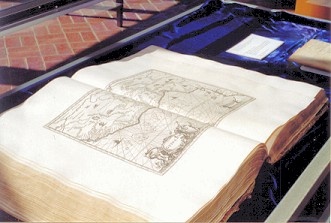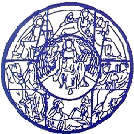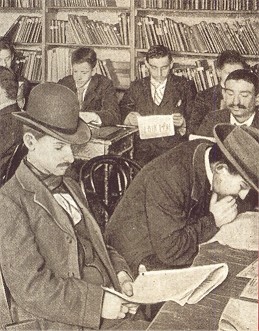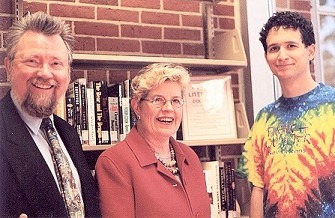A Research Guide for Difficult Times
by Anne L. Noss
Adjunct Reference Librarian
We in the library, like others in the Drew community and throughout the nation, have responded as caring private citizens to the historic events which began on September 11. But we have also responded as professionals, doing what librarians do best: helping our users find the most useful and reliable information sources pertaining to the attack and its aftermath.
Accordingly, the Reference staff has developed a new online user guide, now called September 11 and After: Reliable Information Sources. We made it known by sending an email message to the entire Drew community. And in the days that followed, our site statistics confirmed the usefulness of the page by tallying its high number of accesses.
September 11 and After joins a long list of user guides, most of which are available in both online and paper formats. But it represents a new approach. Our other guides provide assistance with basic library functions, with perennial research topics such as biography or drama criticism, or with our many online databases. September 11 and After, instead, sharply focuses on a particular series of events compelling to students and scholars alike, an in-process chapter of world history. Not surprisingly, those events have brought users to a plethora of related web sites, some invaluable and some of questionable validity. Our guide, which is under continuing development, selects and describes some of the best "reliable information sources" for the benefit of all our users.
For example, we recommend FindLaw's Legal News page, which has ongoing special coverage of the "War on Terrorism." Our guide indicates that two of the site's resources, Documents and Laws, are particularly rich in research materials. The page also links to current news stories and to English-language editions of many international newspapers. A further international perspective is provided by another recommended site: ArabNet, "the resource for the Arab world in the Middle East and North Africa." Again, there are many English-language articles and links, but news articles in the original languages are provided as well.
Finally, we link to some of the specialized pages compiled by our colleagues in other academic libraries. In this way the expertise of the broader library community becomes readily available to all of us here at Drew. We anticipate further development of this page as we identify new resources and as new research needs come forward.
It can also be accessed from the Library's Research Resources page, at http://depts.drew.edu/lib/research.html, in the drop-down box under User Guides. Comments are always welcome and can be sent to drewlib@drew.edu.
Undergraduates Encouraged to Explore Archives
The Archive staff at the Methodist Center has begun inviting faculty in several departments of the College of Liberal Arts for lunch and conversation about library archival collections. A spring 2001 meeting with history faculty has generated several inititatives, including a fall term history department seminar, "Archives: History and Methods," taught by archivist Dr. Dale Patterson. Other College departments have been invited for similar discussions to encourage fuller use of the wide range of research collections in the Archives.
Special Collections Featured This Fall
Spring Semester Exhibits:Faculty Publications, SBL Archives
Some rare and intriguing items from the Library's special collections were displayed in the early fall, including this 1670 volume by John Ogilby (1600-1676) from the McClintock Collection of Early Printed Books, entitled, Africa: being an accurate description of the regions of Aegypt, Barbary, Lybia, and Billedulgerid, published in London by T. Johnson. Also displayed, from the Tipple Collection was a 1791 letter of support from Methodist founder, John Wesley, to William Wilberforce, a member of the British Parliament who was active at that time in an unsuccessful attempt to abolish slavery.
Other materials exhibited included pamplets on slavery from the 15,000-piece Nineteenth Century Pamphlet Collection; interview notes and photographs of Albert Einstein and his son from the Bela Kornitzer Collection, and a selection from the Peter Dornan Samizdat Collection of underground literature from the former Soviet Union. These and much more are accessible to students and researchers at Drew. A complete listing of special collections and how to access them are available from the Research Resources page of the Library web site, http://depts.drew.edu/lib/research.html.
On display through mid January will be Photographs by College alumnus, Jason L. Burch, Class of '91.
Spring Exhibits
In February, materials will be exhibited for the first time at at Drew from the archive of the Society of Biblical Literature. The collection was recently brought to Drew by Director of the Library, Andrew Scrimgeour, who is also the archivist of the SBL.
Faculty Publications, 2001 will be exhibited in the lobby in March and April. Visitors can view what always promises to be a fascinating array of books and articles resulting from the scholarly work of the faculty.
The semester will end with an Alumni Art display.
|
THE DIRECTOR'S CORNER:Tremors in the Library |
The shock waves from the maw of terror in Manhattan assault us at every turn. They show no regard for cultural boundaries, let alone academic havens. They intrude upon our campuses, even the calm precincts of our libraries. Already the Drew Library has been disrupted by an alarm over suspicious-looking white powder. Nothing is safe. Nothing is sacred. Such is the compounding horror of terrorism.
Libraries have never been immune from hostile attack. Fire and hatred are old enemies of books and manuscripts. We shall never recover the Greek classics that were lost to fire at Alexandria in 391 C.E., nor the writings of the saints destroyed in the sacking of medieval monasteries. Savonarola torched thousands of volumes in Renaissance Florence, and in our own time, Nazi bonfires consumed over 100 million volumes, obliterating the intellectual inheritance of an entire civilization.
During the Cold War, a new and horrific enemy appeared on the horizon, one that could exterminate a city and its libraries in a single strike--nuclear warfare. Major cities were rendered vulnerable as preferred targets.
The angst for librarians at that time was the recognition that the largest collections of written materials on earth clustered in four international cities: New York, Washington, London, and Moscow. New York City libraries alone held an estimated 65 million volumes in the mid-1980s. For every living human being who would perish in a nuclear attack on New York, ten books would also be destroyed. This observation may seem sacrilegious to some, for the loss of the writings of the dead can hardly compare to the loss of living human beings. Yet grief at the potential loss of recorded culture was an added pathos that some of us felt at the specter of nuclear war. Then the Berlin Wall came down and our anxiety faded away. Libraries were safe again--until September 11.
Libraries epitomize the genius of democracy. Not only are they the memory banks of civilization, they are the symbolic citadels of the freedom of a people to speak its mind. Any university library worthy of the name vigilantly guards the door against censorship, regardless of what academic or political ideologies claim ascendancy at the time. In the stacks a cacophony of voices is heard on every side of an issue, voices from the past and the present, from the center of the dominant culture, and from the margins. The iconic figures of the past are routinely studied, interrogated, decried, demoted, deconstructed, and revered--but never silenced or discarded. Minor ones and neglected ones are constantly discovered and rediscovered and promoted to principle interlocutors in scholarly discourse. Even the most hostile voices are accorded the same protected space. Diversity reigns in the stacks. Is it any wonder, then, that libraries and the institutions and nations that they represent revolt the Osama bin Ladens of this world?
Fifty years ago, America and its libraries were terrorized by an enemy from within its own borders--McCarthyism. President Eisenhower helped repel its attack on fundamental freedoms with an angry denunciation hurled in a commencement speech at Dartmouth. His words, launched from the lawn of Baker Library, ring true for our own anxious time:How will we defeat communism unless we know what it is, what it teaches, and why does it have such an appeal . . .We have to fight it with something better, not try to conceal the thinking of our own people. They are part of America. And even if they think ideas that are contrary to ours, their right to say them, their right to record them, and their right to have them at places where they're accessible to others is unquestioned, or it's not America.
We will withstand the current tremors to the degree to which we honor this birthright of democracy. The library remains indispensable in this struggle.
-- Andrew D. Scrimgeour
References
Dickey, John Sloan, "Opening Remarks," in American Libraries as Centers of Scholarship (Dartmouth College, 1978), 9-14.
Pugliese, Stanislao G., "Bloodless Torture: The Books of the Roman Ghetto under the Nazi Occupation," in The Holocaust and the Book: Destruction and Preservation, edited by Jonathan Rose (University of Massachusetts Press, 2001), 47-58.
Shriver, Donald W. "A View from My Bedroom Window," The Christian Century 99 (1982), 917.
Recent Gifts
Professor of English Emerita, Joan E. Steiner, continued her generosity toward the University through a much appreciated gift to the Library book endowment fund.
In a gesture supporting libraries, education, and teaching, Dr. and Mrs. Donald Kent contributed generously to the Friends of the Library book endowment fund.
David Caplan sent a kind gift in appreciation for help received with the rare book collection.
A gift honoring the memory of his wife, Gladys McClintock, was received from James McClintock, Professor of Psychology Emeritus and Dean, Emeritus, of the College of Liberal Arts. The donation will be used to purchase books in psychology.
Accreditation Highlights
Drew University was visited by two accreditation agencies this past March, the Middle States Commission on Higher Education, and the Association of Theological Schools in the United States and Canada (ATS). Their observations on the Library included affirmation for:
- The leadership of Dr. Charles Courtney as Acting Director, and the appointment of Dr. Andrew Scrimgeour as Director
- The Library's efforts to develop a more highly visible, collaborative, and interactive presence on and off the campus
- The Lucker Report that outlines a reasonable plan for restoration and expansion of the Library buildings
- Improved coordination with Academic Technology
- Judicious use of consortial partnerships to increase electronic journal collections
- Creation of a course on theological research and writing--a special commendation from ATS
- Extensive research collections of the Methodist Library and the collections of the General Commission on Archives and History of the United Methodist Church; it was urged that they be used by a broader array of students and faculty, such as those in the women's studies program and Early American interdisciplinary studies.
They also expressed concern for:
- The lack of an electronic classroom for research instruction
- The lack of provision for a 24-hour study space
- The development of closer ties between the Library and the Theological School's Curriculum Committee
- Greater involvement of the Theological School faculty in collection development
The Library is well advanced in responding to the observations and suggestions of the two visiting teams.
Recommended Reading: The Intellectual Life of the British Working Classes
In September, the Friends of the Library and the Department of History hosted a book signing to celebrate Professor Jonathan Rose's new book, The Intellectual Life of the British Working Classes(Yale University Press, 2001). The book was received with so much enthusiasm in the United Kingdom that the initial print run of 2,500 copies-a significantly large printing for a hefty academic monograph-was quickly sold out, sending the publisher back to press for another thousand copies within a month of the book's release.
Feature reviews in the major British Sunday and daily newspapers were uniformly favorable and spurred the book's rapid sale. Reviewers were unstinting in their praise: "...Rose's book...has the great virtues of clarity, wit and pungent opinion" (Ian Jack, Telegraph, 16 July 01); "...represents an historical triumph" (A.C. Grayling, Independent on Sunday, 1 July 01); "...should be read with minute attention...by anyone with an interest in the future of our civilisation" (Anthony Daniels, Sunday Telegraph, 1 July 01); "...vast in scope and absorbing in every detail" (John Carey, The Sunday Times, 1 July 01). Interest in the book continues, and Rose has spoken about his work on six BBC programs. Plans for similar appearances on National Public Radio and C-Span in the U.S. were over-ridden by other concerns following the September 11 terrorist attacks.
Rose's accomplishment has been to give voice to the so-called "inarticulate masses" and to prove beyond doubt that they had a great deal to say. By assiduously combing through some 2,000 working-class autobiographies-many unpublished-as well as oral history archives, social surveys, and educational and library records, Rose has determined what the working classes read and how they responded to their reading. Most were self-taught autodidacts. Their efforts to enter a world beyond that of their own experiences, when work involved long hours and physical exhaustion, were truly heroic. Rose recounts the magic, excitement, and enlightenment imparted by reading books.
Will Crooks, who grew up in extreme poverty in London's East End at the end of the nineteenth century, wrote of that magic. As a young man he spent tuppence for a second-hand copy of Homer's Illiad. He was overwhelmed by what he read: "What a revelation it was to me! Pictures of romance and beauty I had never dreamed of suddenly opened up before my eyes. I was transported from the East End to an enchanted land. It was a rare luxury for a working lad like me just home from work to find Myself suddenly among the heroes and nymphs of Ancient Greece." But this reading was not merely a mechanism for escape, as desirable as that might be. Working men and women made clear distinctions between the penny-dreadfuls and good literature – Ruskin, Carlyle, and Defoe were favorites – and they recognized the value of the latter. Through their reading, these working men and women came to think of themselves as individuals, and as their reading expanded, they learned of their oppression and their rights.
The Intellectual Life of the British Working Classes contains much more--about these workers' response to Marxism, their absolute belief that Knowledge is Power, their intellectual independence from bourgeois cultural hegemony. It is a cultural history in the best sense of the term. As a librarian and a reader, I was most moved by its reaffirmation of the value of books and reading and their ability to transform lives. Regretably we no longer live in an age when reading is so highly valued.
-- Linda E. Connors
Associate Librarian
Resources for Study in Medical Humanities
by Ruth Friedman
Reference Librarian
What is the patient's ethical responsibility in the doctor-patient relationship? Should the U.S. government allow and fund research which utilizes stem cells derived from aborted fetuses? Are there cultural implications concerning advance directives or living wills? If a patient has an advance directive, what should be the waiting time before treatment is withdrawn or withheld? What are the issues surrounding the allocation of organ transplants in the global marketplace? These intriguing research questions, and many more which are equally current and important, are the subjects of study by students in the Caspersen School of Graduate Studies Program in Medical Humanities.
In response to growing interest in the area, the Library has expanded its web site to include a page entitled Electronic Resources for Medical Humanities. The research resources which are accessible via this page are as multidisciplinary as the field itself. Core resources include the ATLAS Religion Indexes, General Science Abstracts, Humanities Abstracts, Social Sciences Abstracts, Sociological Abstracts, and Academic Search Premier, Lexis-Nexis Academic Universe and ProQuest Direct, all of which offer the full text of many relevant newspaper and periodical articles. A few of the supplementary and specialized resources are AIDSearch, Annual Reviews Public Health, Annual Reviews Sociology, Annual Reviews Medicine and the full text of several years of the journals issued by the American Medical Association.
Electronic links are provided for web pages offered by government and private agencies. Bioethicsline covers literature in the health sciences, law, religion, philosophy and social sciences. MEDLINEplus has health topics for the consumer perspective. PubMed offers access to MEDLINE, indexing and abstracting the world's medical literature. Other links take you to sites covering men's and women's health.
Listed last, but surely not consulted least, are the current editions of the print classics: Encyclopedia of Bioethics and Bibliography of Bioethics. We encourage you to consult the reference librarians for assistance in using all of our electronic and print sources.
Graduate Research: Holiness and Sanctification in an African Context
by Bruce Lancaster
Reference Associate
Many Western theological ideas and movements were introduced to Africa during the nineteenth century, when large numbers of American, British, and European missionaries of many denominations worked there. What precisely were these ideas? How were they perceived and introduced by the people who brought them to Africa? And, perhaps more important, how were the central theological concepts received and developed by Africans?
Robert Lang'at, Kenyan, Library employee, and third-year Wesleyan and Methodist Studies scholar, is currently engaging these issues, which he expects to become the focus of his dissertation in the Caspersen School of Graduate Studies.
Robert's research leads into a number of areas of inquiry in the library. He is working toward an understanding of the ideas of the early missionaries, dating from 1834. Doctrines of Holiness, sanctification, and salvation, as developed by Wesleyan and Wesleyan-influenced groups, including the German Moravians, are at the center of his study. He is persuing the early African reception of and response to these ideas and their contextualization and development in the new setting, from the earliest days to the living issues of independence in the 1960s. Robert says that his project will be one of the first serious scholarly studies of this area, which is a part of the great endeavor of understanding the contextualization of Christianity in Africa.
His research involves many different library collections and tools, as well as a search for materials likely to be found only in Africa. Drew's collection of early Methodist and missionary materials has proven to be a rich source of material, much of it from nineteenth century memoirs and annual reports. Some modern secondary materials are also available, but others must be obtained in Africa. Drew's bibliographic collections and newer databases like WorldCat are helpful in extending research beyond local confines. Robert has found the older collections to be very strong, but would like to see Drew obtain more modern African materials, particularly periodicals, increase its collection of search engines, and modernize public research computers.
Engaging a fascinating and complex mix of the Library's nineteenth century holdings and newest electronic links with the world, Robert will continue his research until it finds a permanent form in a completed dissertation. His work is expected to lead to an important new step in our understanding of African Christianity.
Bell Scholar is Wesley Authority
The Dean of the Methodist theological school in Reutlingen, Germany, The Rev. Dr. Manfred Marquardt, has spent the fall term at Drew as the Bell Scholar-in-Residence in the Methodist Archives, teaching a seminar on the ethics of Wesley and Bonhoeffer and working on a book on the doctrines of creation and sanctification in the Wesleyan/Methodist tradition. The author of eight books and numerous articles, Dean Marquardt is one of the principal interpreters of Wesley's ethics in our time.
Less Microfilm
The Library has withdrawn microform journal backruns which are available on line through JSTOR. With the web-based catalog providing links to the full text of 150 JSTOR journals, the microforms were little used. Much of the withdrawn microfilm was donated to libraries in the Philippines. Bound volume backruns of the JSTOR journals have been retained.
Library Faculty News
Ruth Friedman was an invited faculty member in the Summer 2001 Minority Medical Education Program (MMEP) offered by the University of Medicine and Dentistry of New Jersey. Administered by the Association of American Medical Colleges and funded by the Robert Wood Johnson Foundation, MMEP's goal is to help promising, highly motivated minority students gain admission to medical schools. Ms. Friedman utilized collaborative learning pedagogy to help New Jersey Medical School's contingent improve their reading, writing, listening, and speaking skills.
Kenneth Rowe, Series Editor of the ATLA Bibliography Series, which he founded in 1974, has just brought out volume 46, Science and Religion in the English-Speaking World, 1600-1727: A Bibliographical Guide to Secondary Literature, by R.S. Brooks and D. Himrod (Scarecrow Press, 2001). Dr. Rowe will retire as Methodist Librarian in June. A national search for his replacement is underway.
Jean Schoenthaler was elected president of the Highlands Regional Library Cooperative--the largest of four regional library cooperatives in the state. With over 900 members from multi-type libraries, the consortium promotes resource sharing of libraries in Warren, Sussex, Somerset, Morris, Bergen, and Passaic counties. She was also one of 100 people invited by the State Librarian, Norma Blake, to develop strategies for recruiting into the library profession.
Andrew Scrimgeour presented a paper at the International Meeting of the Society of Biblical Literature in Rome this summer entitled, "Mapping the Intellectual Geography of Biblical Studies: A Cocitation Study of Journals and Authors."
Suzanne Selinger reviewed Timothy Gorringe's Karl Barth Against Hegemony for Theology Today and wrote a review article on Karl Barth and Eduard Thurneysen, Briefwechsel, Bd. III: 1930-1935, for Newsletter 3 of the Karl Barth-Archiv (Basel, Switzerland). During her spring sabbatical, she continued research on Charlotte von Kirschbaum and Karl Barth in new source materials acquired in Switzerland last year. She also began work on a study of Barth's doctrine of Creation. In August, she learned that her book on Barth and von Kirschbaum was to be translated into German by Theolo-gischer Verlag Zürich, publisher of the Barth Gesamtausgabe.
Student Initiative Helps Launch Popular Literature Collection
The Popular Literature Collection was rolled out late last spring in response to a request from the College's Student Government Association to make books available for recreational reading. The ever growing collection is now shelved in a separate alcove near the reference desk. Books for the collection were initially purchased with funds from SGA and the Library. New material is added as suggestions are received. Pictured here are Andrew Scrimgeour, Director; Linda Connors, Associate Librarian; and Spencer Bates, SGA President. (Photo: V. Debbink)
More Science Journals Available
VALE libraries participating in Elsevier's ScienceDirect program have consolidated journal holdings. Every library generated a "wish list" of new subscriptions, as well as a list of titles they would be willing to cancel if another library agreed to serve as the library of record. Beginning in January, Drew will have electronic access to 787 Elsevier journals, an increase of 140 titles.
About Visions
VISIONS
NEWSLETTER OF THE DREW UNIVERSITY LIBRARY
Dr. Andrew D. Scrimgeour, Director
Drew University Library, Madison, NJ 07940
(973) 408-3322 ascrimge@drew.edu
EDITOR: Anna S. Magnell
PHOTOGRAPHS: Virginia Debbink, A. Magnell
THIS ON-LINE EDITION: Anne L. Noss
A complete online archive of past issues of Visions
can be viewed at:https://uknow.drew.edu/confluence/display/Library/Visions+Library+Newsletter+Archive
VISIONS is a semi-annual publication.
© Drew University Library




